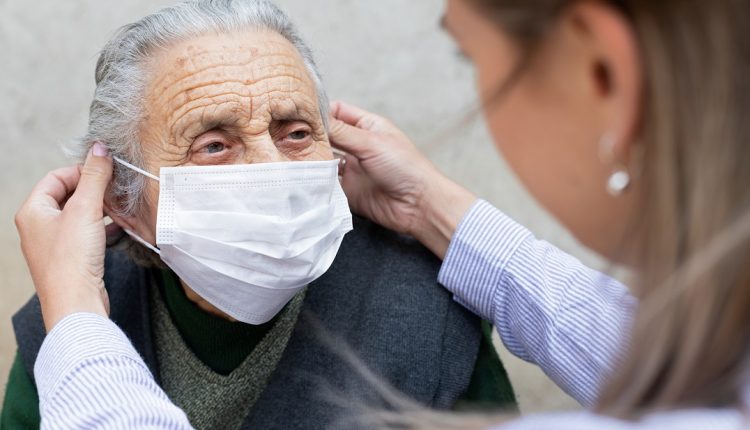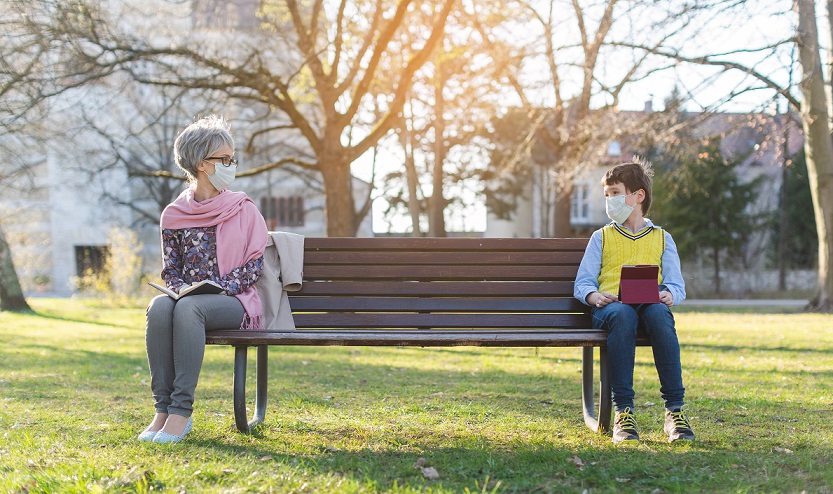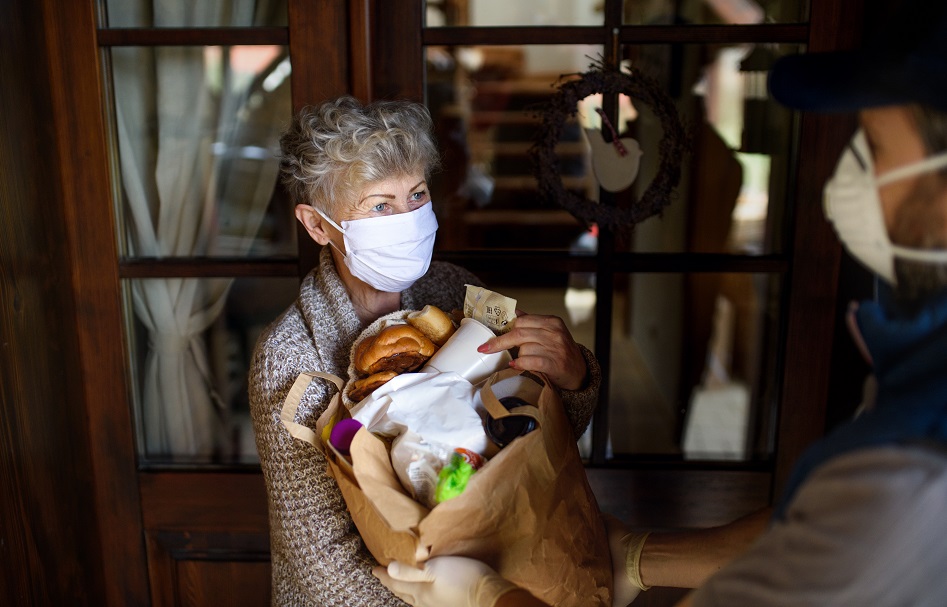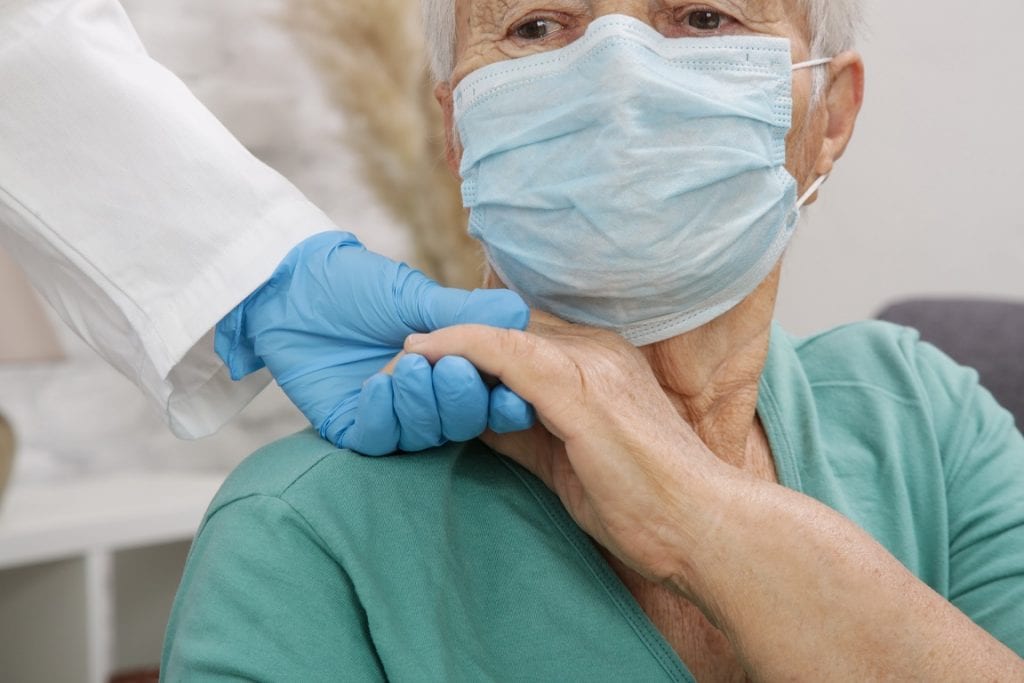
Useful Tips for the Elderly to be Immune to COVID-19
The disease caused by COVID-19 is more severe in the elderly for many reasons, including that the elderly are more vulnerable due to physical weakness. Also, mortality is higher in the elderly, and the complications of the Coronavirus are more likely to occur in the elderly than in any other age group. So it is necessary to take preventive measures to cut the transmission of the virus to the elderly. This article will cover the symptoms and give you tips to avoid Covid-19 in the elderly.
Contents
- 1 Symptoms Covid-19
- 2 How Does the Coronavirus Spread?
- 3 Preventing COVID-19 in the Elderly
- 4 Tips to Prevent Covid-19 for Caregivers and Those Living with Older Adults
- 5 Proper Nutrition for the Elderly Suffering from Covid-19
- 6 Recommendations for the Nutrition of the Elderly with Covid-19
- 7 Tips to Follow After Covid-19 Disease in the Elderly
Symptoms Covid-19
- Headache
- Cough, fever, and weakness
- Muscle pain and conjunctivitis
- Sore throat
- Sudden onset of nasal discharge and sore throat
- Shortness of breath
The virus spreads through contact with the patient’s respiratory secretions during infection, as well as touching contaminated equipment and surfaces.
The symptoms are revealed from 2 to 12 days, and the average period is seven days.
The contagious period of the disease is not yet precisely defined. Usually, the maximum contagion is while the patient is coughing and sneezing, and it is also said it can be transmitted during the latent period.
Preventing COVID-19 in the Elderly
 COvid-19
” />
COvid-19
” />
Corona virus prevention and care in the elderly is crucial because of the vulnerability of this age group. The best way to avoid this disease is as follows:
- Wearing masks and face shields
- Washing the hands frequently with soap and water for at least 40 seconds
- Not touching the mouth, eyes, nose, and face with contaminated hands
- Covering the mouth and nose with a disposable tissue while sneezing or coughing
- Avoiding any contact with patients
- Using alcoholic disinfectants in cases where soap and water are not available
- Do not attend gatherings
- Disposing of contaminated napkins and gloves and throwing them in the trash
- Not touching equipment or surfaces or using disposable gloves in crowded places and on public transportation
- Washing the hands before eating food or fruits
Tips to Prevent Covid-19 for Caregivers and Those Living with Older Adults
- Limit leaving the house as much as possible to reduce the possibility of infection of the elderly member
- Give the necessary hygiene training to the elderly at home and ensure the movement is carried out correctly.
- Wash your hands with soap and water for 40 seconds, or use alcohol-based disinfectants before providing any care, such as feeding the elderly.
- Avoid hugging, touching, and kissing the elderly.
- Never use public transportation for the elderly.
- If the older adult has a history of underlying diseases such as diabetes, cardiovascular, respiratory, and immunodeficiency diseases, prevent the older adult from leaving home.
- Make sure the elderly are drinking at least 7-8 glasses of liquids.
- Try to provide rest and sleep for the elderly at home.
- Be aware of the symptoms of cough, sneezing, and fever in yourself and the elderly member. If you see any of the symptoms, consult your doctor immediately, and inform other family members.
Proper Nutrition for the Elderly Suffering from Covid-19

It’s essential to keep a careful eye on nutrition during the Covid-19 era, to maintain normal body functioning. This is particularly important in the elderly, who are also naturally prone to dehydration; we should hydrate the body and address any respiratory problems. Caregivers in this age group also need to consider the possibility of losing weight due to new conditions in which the body has a high metabolism.
The elderly’s diet should contain antioxidants and vitamins A, C, E found in various fresh fruits and vegetables. Liquid vegetable oils such as corn, sunflower, soybean, sesame, and olive are good sources of vitamin E, and their balanced consumption can help enhance the immune system’s power. It is vital to explain to the patient the significance of consuming fluids and eating a proper high-fibre diet.
Recommendations for the Nutrition of the Elderly with Covid-19
- Daily consumption of 3 to 3.5 litres of fluids and lowering body temperature to prevent dehydration.
- Eat a high-calorie diet and soft foods unless the patient is overweight or obese.
- Eat smaller meals with higher frequency.
- Emphasis on eating more high-fibre foods such as barley bread, whole grains, and fresh vegetables and fruits to prevent constipation.
- Emphasis on drinking plenty of warm liquids such as tea, especially if they have nasal congestion.
- Avoid carbohydrates such as sugar, solid oils, butter and animal fats in meat, and high-fat dairy products.
Eat foods rich in vitamins E, C, B6, selenium, and zinc to strengthen the immune system and fight infections:
-
- Food sources rich in vitamin E include sunflower seeds, wheat germ, potatoes, and shrimp.
- Dietary sources of vitamin C include melons, broccoli, cauliflower, and a variety of fruits
- Food sources of vitamin B6 include beef liver, potatoes, bananas, lentils, and spinach
- Selenium and zinc can be provided using dietary supplements.
More Resources: Best Foods to Prevent Cancer in Old Age
Tips to Follow After Covid-19 Disease in the Elderly
Based on the information available about the disease and its transmission, the World Health Organization (WHO) recommends that all patients with suspected COVID-19 infection with acute respiratory infection be given the health care system’s priority and treatment. Emergency care should be done based on the severity of their illness.
For those with a mild illness, hospitalization may not be necessary unless there is concern about their rapid deterioration. If the symptoms are mild, home care may be considered.
Tips for Home Care After the Elderly Has Been Diagnosed with Covid-19
- Place the elderly patient in a single, well-ventilated room.
- Limit the number of caregivers. Ideally, the caregiver should be in good health and has no underlying chronic conditions. Visitors should not be allowed to visit until the patient has fully recovered and has no symptoms.
- Family members should stay in another room or, if it is not possible, they should stand at least 1 meter away from the patient.
- Caregivers should wear tight medical masks to cover their mouth and nose while in the room. The mask should not be touched during use. If the mask becomes wet or dirty from the discharge, it should be replaced immediately with a new clean and dry mask. Discard the mask immediately after use and wash your hands.
- To limit respiratory discharge, Seniors should use a medical mask. People who cannot tolerate a medical mask should use strict respiratory hygiene, i.e., the mouth and nose should be covered with disposable tissue when coughing or sneezing. Materials used to cover the mouth and nose should be appropriately disposed of or cleaned after use.
- Clean and disinfected surfaces in the patient care room are often touched daily, such as bedside tables, bedding, and other bedroom furniture.
- Use seprate dishes for feeding the elderly suffering from Covid-19. Then you can wash the dishes with soap and water or use disposable plates.
- Clean the patient’s clothes, sheets, and towels with soaps and water or wash them using a washing machine at 60-90° C with regular household detergent and dry thoroughly. Wear gloves when touching the clothes, sheets, and towels of the elderly.
- Avoid exposure to other contaminants from the patient’s immediate environment.

Final Words
The number of elderly diagnosed with Covid-19 is growing and has become a genuine concern. This article’s recommendations can pave the way for keeping the elderly safe during pandemic days. We hope to see the days when the pandemic is over, and we can enjoy our seniors’ company. Paying attention to preventive measures discussed in this article can go a long way in protecting our loved ones from the Corona-virus. Seniors are at a higher risk of serious illness and hospitalization from COVID-19, so it’s crucial to get vaccinated as soon as possible. The vaccines are highly effective in preventing severe disease, hospitalization, and death. For more information, please read the next article: “how does covid-19 influence the lives of the senior citizens?”
More Resources:
- The Best Vitamins for the Elderly during Winter
- Caregiver Responsibilities for Taking Care of the Elderly
This is a sensitive period for seniors. I feel worried every time I look at my grandparents. I just hope everything goes back to normal as soon as possible.
I hope everyone will be okay. I’m tired of hearing bad news. Our seniors are in danger every day, and no one can do anything. I just want this whole virus thing to end immediately.
I’m fully vaccinated. Although I feel better now, I still don’t feel safe. I wouldn’t even leave the house if it wasn’t for walking my dogs. And I miss going to the gym; I don’t think I ever feel safe enough to go to public places with or without a mask.
I don’t know how to calm myself down. My father got vaccinated, but I’m still worried, and I stress out every time he goes out. I wish we could get rid of COVID somehow.
No food keeps Covid-19 away. Foods don’t boost the immune system. They all get broken down into component parts in the digestive tract, and only the parts reach our blood.
A vegan diet improves overall health, but it does not affect whether you contract Covid. The only way to keep Covid away is to keep away from unvaccinated people, get vaccinated yourself, and wear a mask if you must be indoors with other people. Fresh air is also good for your lungs. The only supplement that seems to help is vitamin D, which also comes from sunshine.